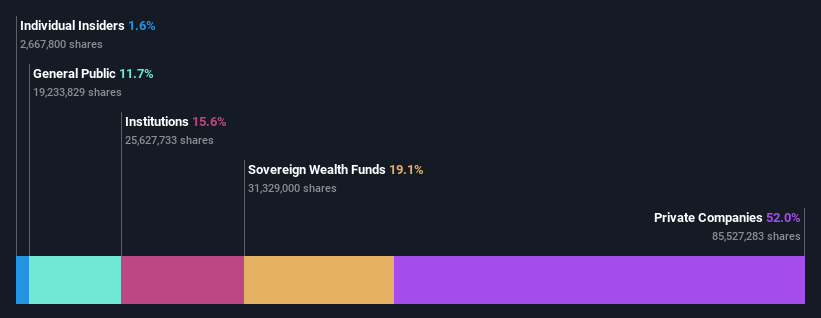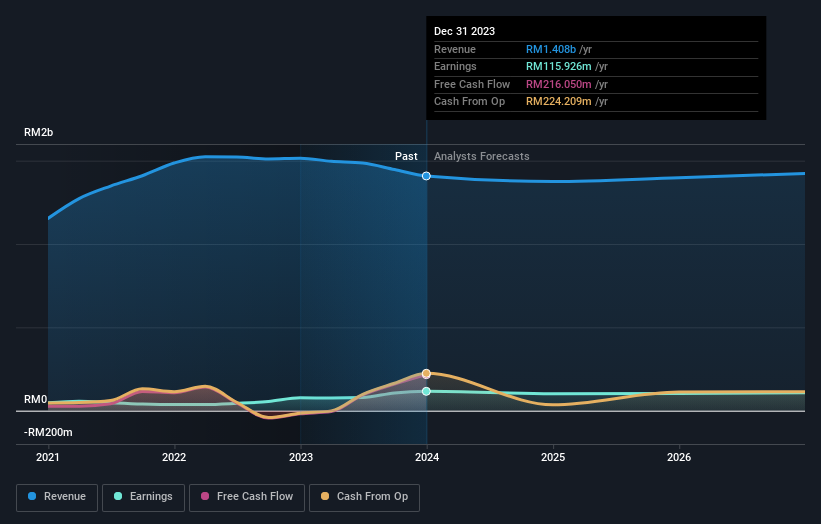Private companies account for 52% of Amway (Malaysia) Holdings Berhad's (KLSE:AMWAY) ownership, while sovereign wealth funds account for 19%
Key Insights
Significant control over Amway (Malaysia) Holdings Berhad by private companies implies that the general public has more power to influence management and governance-related decisions
Alticor Global Holdings Inc. owns 52% of the company
If you want to know who really controls Amway (Malaysia) Holdings Berhad (KLSE:AMWAY), then you'll have to look at the makeup of its share registry. The group holding the most number of shares in the company, around 52% to be precise, is private companies. In other words, the group stands to gain the most (or lose the most) from their investment into the company.
And sovereign wealth funds on the other hand have a 19% ownership in the company.
Let's take a closer look to see what the different types of shareholders can tell us about Amway (Malaysia) Holdings Berhad.
View our latest analysis for Amway (Malaysia) Holdings Berhad
What Does The Institutional Ownership Tell Us About Amway (Malaysia) Holdings Berhad?
Institutions typically measure themselves against a benchmark when reporting to their own investors, so they often become more enthusiastic about a stock once it's included in a major index. We would expect most companies to have some institutions on the register, especially if they are growing.
Amway (Malaysia) Holdings Berhad already has institutions on the share registry. Indeed, they own a respectable stake in the company. This suggests some credibility amongst professional investors. But we can't rely on that fact alone since institutions make bad investments sometimes, just like everyone does. When multiple institutions own a stock, there's always a risk that they are in a 'crowded trade'. When such a trade goes wrong, multiple parties may compete to sell stock fast. This risk is higher in a company without a history of growth. You can see Amway (Malaysia) Holdings Berhad's historic earnings and revenue below, but keep in mind there's always more to the story.
We note that hedge funds don't have a meaningful investment in Amway (Malaysia) Holdings Berhad. Our data shows that Alticor Global Holdings Inc. is the largest shareholder with 52% of shares outstanding. With such a huge stake in the ownership, we infer that they have significant control of the future of the company. For context, the second largest shareholder holds about 19% of the shares outstanding, followed by an ownership of 9.1% by the third-largest shareholder.
While it makes sense to study institutional ownership data for a company, it also makes sense to study analyst sentiments to know which way the wind is blowing. While there is some analyst coverage, the company is probably not widely covered. So it could gain more attention, down the track.
Insider Ownership Of Amway (Malaysia) Holdings Berhad
While the precise definition of an insider can be subjective, almost everyone considers board members to be insiders. Company management run the business, but the CEO will answer to the board, even if he or she is a member of it.
I generally consider insider ownership to be a good thing. However, on some occasions it makes it more difficult for other shareholders to hold the board accountable for decisions.
Shareholders would probably be interested to learn that insiders own shares in Amway (Malaysia) Holdings Berhad. It has a market capitalization of just RM1.2b, and insiders have RM19m worth of shares, in their own names. Some would say this shows alignment of interests between shareholders and the board. But it might be worth checking if those insiders have been selling.
General Public Ownership
With a 12% ownership, the general public, mostly comprising of individual investors, have some degree of sway over Amway (Malaysia) Holdings Berhad. While this size of ownership may not be enough to sway a policy decision in their favour, they can still make a collective impact on company policies.
Private Company Ownership
Our data indicates that Private Companies hold 52%, of the company's shares. It's hard to draw any conclusions from this fact alone, so its worth looking into who owns those private companies. Sometimes insiders or other related parties have an interest in shares in a public company through a separate private company.
Next Steps:
While it is well worth considering the different groups that own a company, there are other factors that are even more important. To that end, you should learn about the 2 warning signs we've spotted with Amway (Malaysia) Holdings Berhad (including 1 which is significant) .
Ultimately the future is most important. You can access this free report on analyst forecasts for the company.
NB: Figures in this article are calculated using data from the last twelve months, which refer to the 12-month period ending on the last date of the month the financial statement is dated. This may not be consistent with full year annual report figures.
Have feedback on this article? Concerned about the content? Get in touch with us directly. Alternatively, email editorial-team (at) simplywallst.com.
This article by Simply Wall St is general in nature. We provide commentary based on historical data and analyst forecasts only using an unbiased methodology and our articles are not intended to be financial advice. It does not constitute a recommendation to buy or sell any stock, and does not take account of your objectives, or your financial situation. We aim to bring you long-term focused analysis driven by fundamental data. Note that our analysis may not factor in the latest price-sensitive company announcements or qualitative material. Simply Wall St has no position in any stocks mentioned.

 Yahoo Finance
Yahoo Finance 

